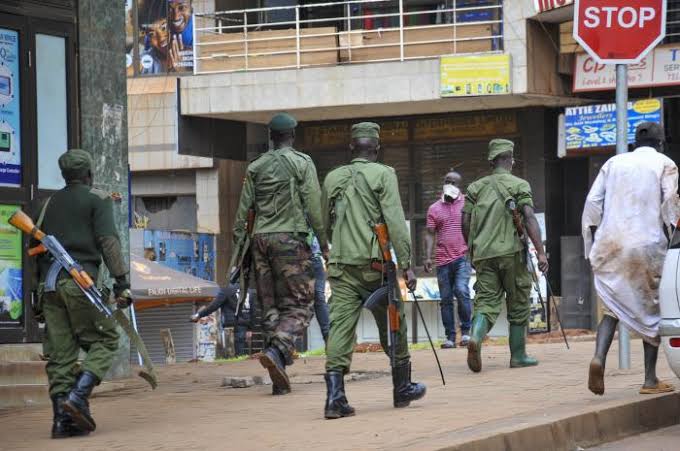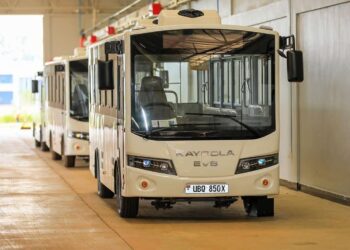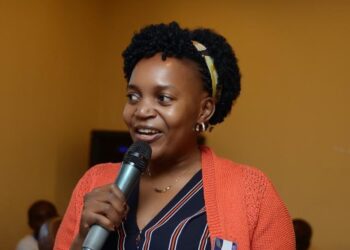July 30 marks the end of a 42-day lockdown placed on Uganda in June by Gen. Yoweri Museveni among measures to control the spread of Covid-19.
Security forces have since June 18, when he made the announcement, been forcefully stopping any unauthorised movement of people during day or night. The millions of Ugandans who are starving in their houses will be anxious to know whether the additional chains on their lives, as a result of the pandemic and lockdowns, are loosened or tightened. The most logical thing in our circumstances would be to open and let people return to work. Uganda cannot defeat Covid-19 with authoritarianism and guns, but people can negotiate their way through it with their attitude and actions.
The NRM government’s target is to vaccinate 50 percent of the population which is about 21 million people. By early this week the country had administered just over 1.1m dozes of covid-19 vaccines. It is not clear how many people have so far been vaccinated but Prime Minister Robinah Nabbanja told Parliament last week that just about four percent of the target number had received the jab.
While we wait for the vaccines, which the government is begging from richer countries, we will have to continue with our home made herbal concoctions whether we have the virus or not (there is no capacity to test us) because that is the best we can do.
If you cannot vaccinate people, and you can’t feed them, it is ridiculous to stop them from finding their way around the situation. Unfortunately the state has increasingly been taking away people’s power to the extent that by now, the central leadership is totally authoritarian, and local leadership has been rendered powerless. Our responsibility and ability as individuals and communities has been robbed away by a few individuals who use authority and the gun to squeeze us into destitution – that state where you feel incapable of anything other than following orders and receiving whatever crap is thrown at you.
For the good of the nation, it is important to acknowledge what works and what does not work, under our circumstance. Most Ugandans live like chicken. If they don’t work today it means they will have nothing to eat tomorrow. Lockdowns are a far greater distortion to their livelihoods than the pandemic.
I am among those who strongly opposed the first lockdown in March 2020 as it loomed. I even sent a communication to Dr. Jane Ruth Aceng, the Minister of Health, showing her an alternative approach but I think she was being bombarded with a lot of information during that time so mine could have gone unnoticed. Like most people do these days, I took my frustrations to Facebook and warned that someone would fall from heroine to villain. The judgement is yours. But what did we achieve in the first lockdown?
The priority was to stop the spread of the virus: “Wash your hands, sanitise, keep a social distance, stay home.” Wherever a case was reported specialists flew in with an ambulance. There was “contact tracing” and “quarantining” – very expensive measures – while people starved in their houses. No one was allowed to distribute to them food but authorised government agents. People waited for food but in vain.
Poor boda-boda riders who attempted to get out and scratch for survival risked the wrath of anxious and ill trained LDUs as well as other security forces. I don’t want to talk about where all the “covid money”, donated and borrowed, went because that will disrupt my present thoughts. Did we stop the spread after locking people in their homes for months, closing everything and going after anyone who ventured off the given guidelines? No.
That one variant is more dangerous than the other matters little. What is important is the capacity to deal with Covid-19, regardless of the variant. Football fans in Europe are back in their stadia. We in Uganda and other poor countries watched in envy on our screens as mask-less Europeans filled their stadia during the recent UEFA EURO-2020. They are back to active living while lockdowns are pushing us closer to our graveyards each passing day. Why? Because instead of solving problems our way, we often want to solve them their way, and we eventually fail.
One of the biggest problems we have, and this has been alluded to by so many people, is the so called elite class. Their poor parents sacrificed everything they had to see them through school with the hope that they would bring prosperity to their families and communities. But most of these are either swimming in corruption or are victims of denial and fear.
Those who seat in boardrooms can’t boldly tell their bosses the truth. They are only told what to do and how to do it, even when they are more learned and better positioned to advise the bosses. The other group debates on social media and that is all. The plain truth is that Ugandan leaders have bungled properly in managing the pandemic and succeeded very well in torturing their citizens into further fear and submission.
Let’s have a flash back. On May 29, Gen. Museveni addressed the nation and told those upcountry to avoid Kampala and Wakiso where Covid-19 was on the surge. If his government had capacity at that time to handle the infected, take care of the sick and provide food for the poor city dwellers, they would have locked those hot zones in time, just as it has been happening in other countries.
Museveni returned on June 6 and ordered a lockdown for 42 days but gave learners four days to travel back to their homes.
This was also an indirect message to those who starved in urban areas, especially in Kampala and Wakiso, during the previous lockdown to run to their villages before those four days elapsed. It was an admission that the government had no capacity to deal with the sick or those that would need food support. People had to be left on their own, but authority and guns had to come out to show them that someone was still in charge of the country.
Returning students and fearful urban dwellers scattered the virus across the country. Death immediately spiralled. Dead bodies were everywhere. In the rural area where the lockdown found me, the elderly were quickly signing out while other bodies were being brought in mainly from Kampala and Wakiso. By the time he returned on June 18 to order a harder lockdown for 42 days, the situation was completely out of control.
We did not stop going to burial sites as the president had ordered. Those who died from our villages we wrapped and buried in our own usual way, accept with more urgency. Bodies from elsewhere were being brought in a especial way by strange people. We had to stand a distance as men in white performed their rituals and sunk into the ground our loved ones.
Every serious or critical case of illness that left our villages and reached a major hospital was covid-ised (diagnosed as COVID-19 as if other diseases had vanished). Hospitals, ambulances, funeral service companies went into a bonanza. The murmurs in our community were about the government stealing from its people even during hard times such as death of a loved one – the bills for “covid corpses” were beyond imagination. We kept our sick and treated them from home. I am very sure this has happened everywhere in Uganda.
No one should blame us because the healthcare system in Uganda is badly wanting. Infrastructure, supplies and human resource are all insufficient. When it comes to managing Covid-19 the story is even worse. At the national level, for example, Museveni ordered the purchase of 42000 hospital beds for treating Covid-19 patients but a year later, upon the president’s grilling, the Permanent Secretary of the Ministry of Health, Diana Atwine, reported that they had installed only 3000 beds.She still holds her office!At the local level, again another example, our nearest government health centre has been diagnosing any patient who visits it from a distance and throwing tablets at them.
They don’t allow them to get anywhere close to the entrance. The poor nurses neither have the right clothing to wear during this pandemic nor the capacity to test for covid-19.
Meanwhile, here we continue to socialise even in the evening over a drink. But we have enough discipline to wash our hands and social distance. We even drive our cars and use our boda-boda transport as before. The case is not different in most parts of Uganda. It is mainly Kampala and Wakiso suffering the violence and extortion of security forces.
Using the gun only allows the gun wielder to extort money from the public but does not stop the spread of the virus. What we need to do is to allow people to manage the pandemic by themselves, within their respective communities, during transit and during interactions with other communities.
Let us tell everyone that the government is not responsible for their lives. This does not sound politically interesting but it should work. It will allow communities to educate and remind themselves about their responsibility to protect themselves, about the dangers of not following the given standard operating procedures. Let them police themselves on wearing masks, sanitising and keeping social distance – be it in the market, church or during a village gathering.
Let people manage the pandemic themselves.
The writer is a Science Journalist and the Head of Research, National Unity Platform (NUP)
Do you have a story in your community or an opinion to share with us: Email us at editorial@watchdoguganda.com













